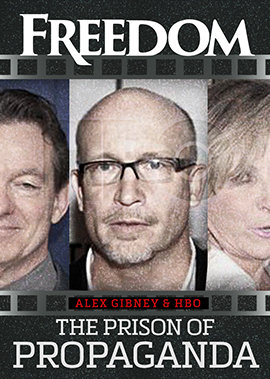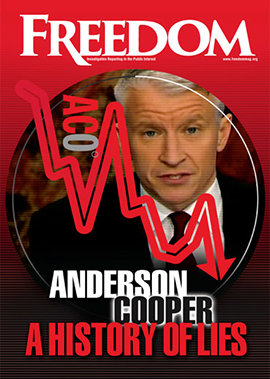But Rexulti can help!
As we watch, she is now smiling, her hair styled. She walks confidently with her adorable little corgi dog into a pet gift shop, as we hear: “Rexulti can cause serious side effects. Elderly dementia patients have an increased risk of death through stroke. Antidepressants may increase suicidal thoughts and actions and worsen depression in children and young adults.” (She’s buying a pie! For her DOG! How cute is THAT?!)
“Report new or sudden changes in mood, behavior, thoughts or feelings, or if you develop suicidal thoughts or actions.” (It’s a party with happy decorations in the yard!)
“Report fever, stiff muscles and confusion, which can be life-threatening.” (The family arrives! Everyone’s happy! Her little girl hugs her!)
Be distracted! Pay no attention to those side effects behind the curtain!
“Or uncontrolled muscle movements, which may be permanent; high blood sugar, which can lead to coma or death.” (That older woman smiling at her with relief must be her mom! She’s happy that her daughter is on Rexulti! They share an unspoken moment of joy.)
“Weight gain, increased cholesterol, low white blood cells.” (The adorable corgi dog has joined the party!)
“Unusual urges, dizziness when standing, falls, seizures, trouble swallowing or sleepiness.” (WHAT is that silly dog DOING?! Everybody laughs!)
Meanwhile, throughout, a subtitle reminds us: “These are not all of the side effects.”

We’ve all seen these commercials—the smiling people doing smiley things, often in slow motion, accompanied by lulling elevator music as a distraction to the mandated recitation of the grim side effects brought about by psychiatric drugs. This one was a 60-second ad hawking an antidepressant “booster” drug, 30 seconds of which contained dire warnings of the severe—sometimes lethal—consequences of imbibing it.
But who wants to hear that? How about that happy music and the beautiful family seen through sunny filters? What a happy world—with Rexulti! Ask your doctor!
Occasionally, the details of the darker side of the drugs can be read as well as heard as they flash by at the very bottom of the screen—that is, they could be read if you’re a microbe with a doctorate in pharmacology.
The rest of us, fat chance.
And that’s what the nearly $40 billion psychiatric drug industry wants: Be distracted! Pay no attention to those side effects behind the curtain!
But that curtain should soon be cast aside. On November 20, new FDA rules went into effect, requiring drugmakers to stop distracting viewers from the crucial facts telling them precisely what they’re swallowing and what it’s doing to their bodies and minds after they do. For 15 years, the FDA worked on these rules, which now appear in a nine-page document entitled “Direct-to-Consumer Prescription Drug Advertisements: Presentation of the Major Statement in a Clear, Conspicuous, and Neutral Manner in Advertisements in Television and Radio Format Final Rule.”
The new rule is precisely targeted, saying the guidelines “apply to advertisements for human prescription drugs that are presented directly to consumers, are in television or radio format, and state the name of the drug and its condition(s) of use.”
The new rule is precisely stated as well, leaving no question that the ad must “not include audio or visual elements, alone or in combination, that are likely to interfere with comprehension of the major statement.” (“Major statement” is the catalog of major side effects associated with the advertised drug.)
The new rule is well-intentioned, aiming to limit the cuddly dogs, adorable children and syrup or ooze that distracts the viewer from learning what he’s about to swallow.
For years, Big Pharma has circumvented, skirted and otherwise gotten around the 2007 law.
Now, suppose you sit on the board of Eli Lilly or Pfizer or Forest Laboratories, mega companies with their eye on the big bucks. Suppose some breathless junior executive runs into your meeting with the new nine-page guidelines from the FDA. Copies of the document are passed all around.
Do you suppose the main thrust of that meeting will be, “OK, so how do we comply with these new rules?”
Um, no. More likely: “Get our legal team on the horn—now! We gotta get around this b—s—t somehow.”
For years, Big Pharma has circumvented, skirted and otherwise gotten around the 2007 law directing the FDA to ensure companies broadcast the risk factors of their drugs “in a clear, conspicuous and neutral manner” by doing just that, but as background to blissful fairylands of happy people living perfectly perfect lives.
But that’s all over now. So what’s a self-respecting multibillion-dollar industry that owes its very existence to pulling the wool over the public’s eyes to do?
Enter the influencer. Enter the internet telehealth company.
The new FDA rules, wonderful and well-intended as they are, apply only to drug companies—the folks who actually make the drugs.
Furthermore, they apply only to ads that “are in television or radio format.”
Any mention of the internet is nowhere to be found in the guidelines, nor are Instagram (founded in 2010) or TikTok (founded 2016). Remember, the FDA mavens had been closeted for 15 years working on this nine-page document. (While they were working, the world went cyber.)

And that is the loophole: Neither the online influencers nor the telehealth companies have anything to do with the manufacture or distribution of Big Pharma’s drugs and are therefore not covered by the FDA rules. Nor is anything online—not being “television or radio format.” Social media is also cheaper for Big Pharma, and people inevitably trust their TikTok influencer over a pharmaceutical company.
As the drug companies were given 11 months to prepare for the new guidelines to take effect (they were released in December 2023), partnerships have, therefore, already been forged between Big Pharma and social media influencers and telehealth companies, who get paid to peddle and persuade.
That unholy marriage—accountable to no one—has attracted congressional concern. “The power of social media and the deluge of misleading promotions has meant too many young people are receiving medical advice from influencers instead of their health care professional,” Senators Dick Durbin of Illinois and Mike Braun of Indiana wrote the FDA this past February.
The pair’s recently introduced Protecting Patients from Deceptive Drug Ads Online Act is aimed at closing that loophole by widening the accountability net. Instead of holding drugmakers alone accountable for soft-soaping dangerous drugs as the present FDA rule does, the new bill embraces everyone—drug companies and social media influencers and telehealth companies. Anyone selling or promoting the drug companies’ drugs must divulge on-screen exactly who or what is paying them for it.
If the bill becomes law, not only will the party—cuddly dogs and the rest—be over for Big Pharma, but that industry may need to do something for the first time in its history: Tell the truth.






















